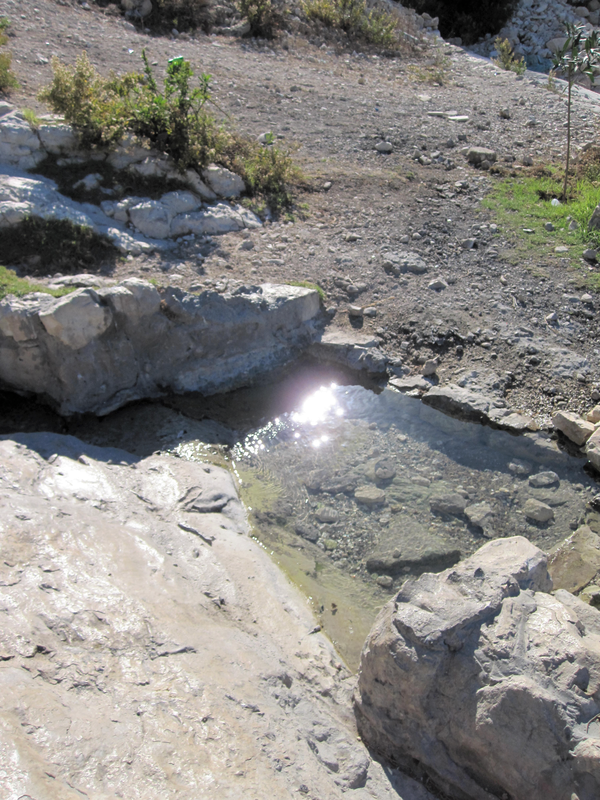
Photo by Father John Keating, O.Carm.: The Lower Spring of Elijah at the wadi ‘Ain-es-siah, Mount Carmel, Haifa, Israel.
By Father John Keating, O.Carm.
Words, words, so many words…. I am reminded of the 10th chapter of the Book of Proverbs: “A flood of words is never without fault; whoever controls the lips is wise” (v. 19).
So many words that do not build peace! How often we hear divisive, harsh and destructive language circulating and destroying so much of what is held dear and precious! This is, of course, silence of the tongue.
Surely, the antidote must be the recovery of the balance of sound and silence, for this can flow into gentleness, tenderness and compassion. Perhaps today there is a call to be attentive to that balance and to “smallness” rather than to greatness.
Of course, these gentle attitudes will not always be exalted as world-shattering. Some years ago, on one of my visits to Mount Carmel in the Holy Land, I stood alone at the early 13th-century site of the first Carmelite hermits. In that humid fatigue of the midday heat, standing near the spring of the prophet Elijah, I looked out from the valley towards the shimmering blue Mediterranean Sea. Suddenly, a gentle breeze passed me by and refreshed the moment, a moment that I have never forgotten, for it “revived my spirit.” It was linked to my memory of 1Kings 19:12, where God is revealed, not in the earth-shattering experiences, but in a gentle, whispering voice.
In a way, this text and the experience unite nature/place or space/voice with the presence of the Living God. The writer and Trappist monk Father Thomas Merton saw all things in life connected to each other. With so much noise, we may be in danger of forgetting how to handle silence as an expression of tenderness and solidarity with all of God’s creation. Often bombarded by words, Father Merton wrote in “Thoughts in Solitude”: “If our life is poured out in useless words, we will never hear anything, never become anything, and in the end, because we have said everything before we had anything to say, we shall be left speechless at the moment of our greatest decision” (91).
People have never been so connected, so mobile by modes of transport and the internet, yet maybe never so interpersonally disconnected, even to God. Do we need to disconnect from what we call progress in order to reconnect? In everyday things, if we unplug an electrical device, we hope that in re-connecting we will solve the glitch in the machine. The Gospels speak of the Lord going apart to be alone, we might say to disconnect. Going apart indicates some other place or space. He goes apart to “a lonely place” to pray, to reflect, driven by the Spirit into the wilderness.
A very simple example may help our understanding of the importance of reflective places. I use the image of a pool of water: we can look up at the stars in the night sky, but we can also look to their reflection in a pool of water. Going apart to a silent or lonely place to look up, we may find ourselves looking down into the pool of our lives. It would most certainly afford us many thoughts; words and memories will come flooding in. Looking down deep within is both painful and refreshing.
We may think we are going apart to be apart, but in fact we are going to a place of encounter. Ultimately, this is not about the actual place, but the relationship that memories engender. Going apart in silence to reflect allows for the possibility of healing and growth. In seeking God, we will be seeking ourselves. As Psalm 23 puts it, “near restful waters he leads me to restore my drooping spirit” (v. 2-3).
St. John of the Cross, reflecting on contemplation as a pure gift, speaks of it as the prayer of silence, beyond outer words. Paradoxically, our silence allows us to listen to the silence of God. It is a journey of return, a pilgrimage to a place of encounter. In this place, St. John wants Christ to be re-born in us, to return home if we have lost our way. Only God can point the Way: “This is my beloved Son, listen to him” (Lk 9:35).
In the second book of “Ascent of Mount Carmel,” St. John of the Cross says: “Fasten your eyes on him alone because in him I have spoken and revealed all and in him you will discover even more than you ask for or desire.” This is truly reconnecting and opening pathways for new discoveries.
Perhaps, in the fear of the pandemic, we have discovered silence anew in our lives. We may have forgotten how important tenderness and compassion reflect true wisdom; how weakness, vulnerability and age are truly part of the fabric of human life requiring our love. Christians are lovers, it is our vocation. We know that lovers, especially those who are falling in love, go apart to be alone and to savour the sweetness of their love. They emerge united to face whatever is ahead of them with a newly found liberty and unity.
“If I should walk in the valley of darkness…. You are there” (Ps 23:4).
Suggested listening: John Rutter, “The Lord is my Shepherd” in his “Requiem” (Choir of Clare College Cambridge with Timothy Brown – NAXOS)
Bibliography:
1. The text of St. John of the Cross is from Book 2 of the "Ascent of Mount Carmel," 22,5 in pages 230-231 of the Kavanaugh-Rodriguez translation.
2. Scripture passages cited from New Jerusalem Bible.
John Keating is a Carmelite friar (O.Carm.) presently living in Ireland. Having studied in Rome and Paris, he has been engaged in retreat, conference and youth ministry for many years and at the same time, a lecturer at the Milltown Institute of Philosophy and Theology in Dublin. He has just completed twelve years on the General Council of the Order with responsibility for the European geographical area. In the 1990’s he spent a year in silence and solitude on the shores of Lough Derg in Ireland.

